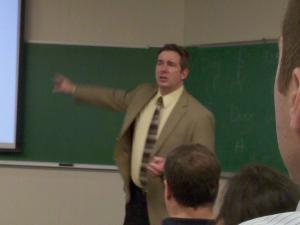 Ethan Johns photo: Deception expert Frank Marsh spoke to Mercyhurst College Intelligence students on Saturday, March 20.
Ethan Johns photo: Deception expert Frank Marsh spoke to Mercyhurst College Intelligence students on Saturday, March 20.
It’s a bad idea to lie to Mercyhurst College Intelligence students. On Saturday, March 20, hundreds of students learned how to detect lies from deception expert Frank Marsh.
Frank Marsh has taught deception detection, intelligence analysis, critical thinking and other classes to intelligence and law enforcement professionals all over the world.
Marsh filled Saturday’s lectures, called “3D – POW: Danger – Damage – Deception Power of Words” with jokes and hands-on case studies to engage students. The lectures provided Mercyhurst’s future intelligence analysts with techniques on how to determine if someone is lying by looking at body language and verbal and written statements.
“The words we people use to deceive are the very words that give them away,” Marsh said.
According to Marsh, 90-95 percent of deception is omission. The omission of words, especially pronouns, is an easy way to detect deception. Some other ways to spot deception are bad grammar, inconsistencies in word choice and the inclusion of explanations and unimportant information.
For those students entering law enforcement, Marsh included specific techniques to detect violence.
“Silence equals violence. With more adrenaline, a person can’t hear. That is the most dangerous time,” Marsh said.
Another important technique in detecting deception is body language. If people change their body language or step away when answering a specific question, they are most likely lying or sensitive to the topic. Conflicts in body language, like a suspect nodding his head during an adamant denial of murder, are blatant signs of lying.
Director of the Undergraduate Intelligence Studies program Dave Grabelski worked with Marsh at the National Drug Intelligence Center and is responsible for bringing him to Mercyhurst. Grabelski said he hopes to bring Marsh back to Mercyhurst.
Many students in Grabelski’s law enforcement class expressed interest in hearing Marsh again, and even participating in an 8-hour class on deception.
Wound into the lecture were two concepts familiar to Mercyhurst’s intelligence students: the importance of communication skills and the benefit of continually asking questions.
“We must understand that everything we do and don’t do communicates something, even when we are not saying or doing it,” Marsh said early on in the three-hour lecture.
Throughout the lecture Marsh reminded the audience, especially those members who work as police officers, about the harmful power of negative thinking and the effect working with murder, sexual assault and other horrible cases can have on a person.
“The thoughts you think are more important than anything you say to anyone else,” Marsh said.
